Iran has launched hundreds of aerial drones and missiles at Israel, marking a widely anticipated reprisal attack. It is the first such direct clash between the two enemies, who have been engaged in a years-long shadow war, with Iran using proxy forces. The Israeli military said Israel and other Continue Reading
US President Joe Biden has arrived in Israel to express his solidarity and discuss war plans with its leaders. He landed in Tel Aviv on Wednesday and was greeted warmly by Israeli Prime Minister Benjamin Netanyahu. But the high-stakes visit has been overshadowed by a blast at a crowded Gaza hospital in which hundreds are […]Continue Reading
Israel formally declared war and has given the green light for “significant military steps” to retaliate against Hamas following its weekend attack. Israel’s military scoured the country’s south for Hamas fighters and guarded breaches in its border fence. It pounded the Gaza Strip from the air on Monday as it vowed to lay total siege […]Continue Reading
Israel’s health ministry says at least 545 people have been injured in the Palestinian attacks, according to the Reuters news agency. Dozens of gunmen from the Islamist militant group Hamas appear to have infiltrated southern Israel in a surprise attack from the Gaza Strip It comes as thousands of rockets were launched into Israel from […]Continue Reading
Hundreds of thousands of Israelis have taken part in what some are calling the biggest protest in the country’s history. Protests against government plans for a radical overhaul of the judicial system have been running for 10 weeks. Record numbers of demonstrators turned out in cities such as Haifa, while about 200,000 are believed to […]Continue Reading
Israeli medics say, one person has been killed and 14 others wounded by two separate explosions that targeted busy bus stops in Jerusalem. According to a report, the first blast was reportedly caused by a device left at a bus station on the city’s outskirts, as it wounded 11 people, one of whom died in […]Continue Reading
Five Palestinians, including several gunmen, have been killed in a major Israeli raid against a militant group in the occupied West Bank. Palestinian medical sources say, a sixth Palestinian was shot dead by Israeli troops who were attacked with stones in a protest against the raid. The operation in the Northern City of Nablus targeted […]Continue Reading
Yair Lapid is poised to become Israel’s new prime minister, with parliament preparing to dissolve itself and trigger the country’s fifth election in less than four years. Mr Lapid, the leader of the centrist Yesh Atid party and Foreign minister, will take over from Naftali Bennett under an existing power-sharing deal. They formed an unlikely […]Continue Reading
An 18-year-old man died on Saturday from injuries he sustained while trying to save his dog from drowning two days before Rishon Lezion, Israel. The man jumped into a lake in the central city of Rishon Lezion on Thursday after his dog was swept into the water. The youth then began struggling in the water […]Continue Reading
Sirens have sounded out across Israel to pay tribute to the millions killed during the Holocaust. Report says, streets came to a standstill as pedestrians and drivers paused to mark the memorial day, which holds every year. A remembrance ceremony also took place at Yad Vashem, Israel’s holocaust memorial centre, to commemorate the six million […]Continue Reading
Five people have been shot dead by a Palestinian gunman in a suburb of the Israeli city of Tel Aviv, in the third deadly attack of its kind in a week. It happened in Bnei Brak, one of the country’s most populous ultra-Orthodox Jewish areas. The gunman was shot dead by police, a paramedic at […]Continue Reading
